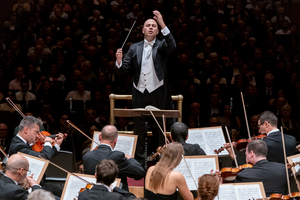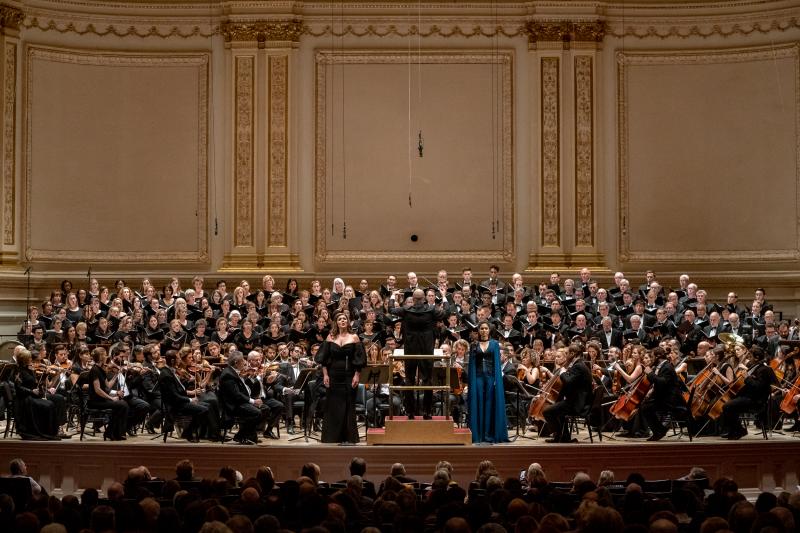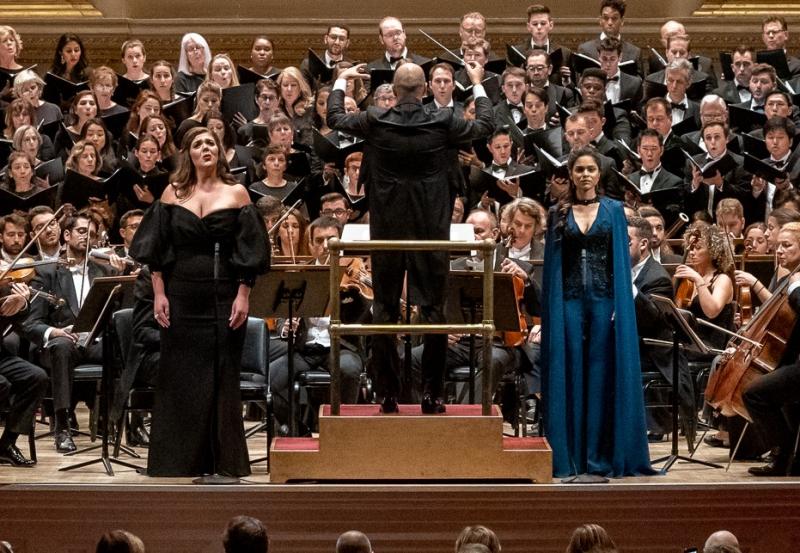Review: THE ATHENS PHILHARMONIC DEBUTS AT CARNEGIE HALL

Whenever a new orchestra is born it is an exciting and nerve-wracking time. Most come out of the gate somewhat tentatively, conservatively, looking to avoid landmines. One can usually expect to hear a debut with Mozart or Beethoven, or something like Sibelius 1st or Dvorak 9th. In other words, something safe.
Apparently, the Athens Philharmonic didn't get the memo. For their auspicious Carnegie Hall debut on Thursday evening, they made the extraordinarily bold choice of the mammoth Mahler 2nd Symphony, "Resurrection," - a supremely challenging work for any orchestra - let alone one that is less than a year old!
The Herculean task of marshalling together the forces of 126 musicians, a 200-piece chorus and two soloists fell upon the shoulders of Maestro Yiannis Hadjiloizou and he was more than up to the challenge. The new orchestra's performance far exceeded all expectations.
The evening began with two short pieces - one composed by the conductor himself and one by his father, the noted composer Michael Hadjiloizou. The "Ballet" from Hadjiloizoi's opera "9th of July," opened the program and set the mood for the entire evening. The exultant string orchestra piece celebrates the liberation of Cyprus, beginning with a swaggering almost celebratory melody that carefully evolves into a hymn-like, solemn conclusion.
The conductor's original piece was a celebration of the joy and simplicity of Cypriot Folk Dances. From the first notes, the "Servikos" transported the audience to the warm waters of the eastern Mediterranean. Like Brahms and Dvořák whom he cited as models for his composition, the composer delicately combined traditional melody and rhythms within a modern orchestral setting and the results were delightful.
After a brief reset of the stage, the maestro returned to the podium for the evening's centerpiece.

The opening chords of the Mahler were explosive and powerful, if not razor sharp. The lower strings began tentatively but any early nerves soon melted away and crispness replaced hesitance. The conductor's choices for the first movement highlighted the drama - tending to hasten the pace of the faster sections and decelerate the slower ones. It became evident early on that Maestro Hadjiloizou had no intention of playing it safe and that his take on the 2nd was going to be one of great, often thrilling extremes. There were occasional moments where the thrills exceeded the precision, and a few intonation issues in the horns, but there was nothing self-conscious or indecisive about Hadjiloizou's approach and it made for an enormously fresh and spontaneous performance.
The sprawling grandness of the opening movement allowed for some very expansive playing, and occasionally languid tempi, but at no time did the piece loose shape, rather it brought into clearer focus the depth and multitude of layers.
The majestic ascending figure that followed, floated beautifully with the double basses unusually clear in the mix. In the first development, the woodwinds displayed supremely delicate pianissimi on the rising theme, balanced beautifully by tender underpinning from the horns. The restatement of the opening figure at the beginning of the second development was thunderous, and fierce, as if the gates to a mysterious darker realm were opening.
The first part of the second movement allowed for the strings to really shine. It is interesting to note that the entire violin section tended to gently rock forward and backward together, giving the impression of a great flower opening and closing - suggesting a genuine (and very rare) "sympatico" between the players. Mahler intended for this lovely section to be a happy remembrance of life's most joyful moments and the conductor deftly drew forth some ravishingly melancholy playing from the cellos to bring the point home.
For the scherzo 3rd movement, the maestro created a luminous almost spectral quality to the woodwinds, with special kudos to Mina Tsamou on clarinet for some exceptionally gorgeous playing. The Maestro's love of the folkmusic of his home Cyprus produced an especially lyrical take on Mahler's own use of the folkloric medium in scherzo. So much so that when the brass finally burst forth, it was like a great ray of light piercing through the clouds and bringing the entire performance to a new height, and leading up to a massive and chilling "Cry of Despair" chord.
The "Urlicht" (or Primal Light) was a great slow-burn, intense and focused. Written in D flat major (an interesting and somewhat remote distance from the work's overall tonality of C minor), the section has the effect of taking the audience on a journey of itself far from the rest of the piece. Mezzo Soprano Daveda Karanas' wonderfully rich, velvety voice brought a particularly poignant lieder-like quality to the Wunderhorn tune. She had the appearance as if she was in another world as she unveiled the pathos and weltshmertz of the poetry, and her voice wafted effortlessly across the hall in deep dark waves.

The massive final movement (longer than many symphonies) is truly the finale to end all finales. The movement recapitulates no less than five magnificent themes that appear, fade and reappear in different guises. It all began with the same apocalyptic "cry of despair" that closed the third movement, signaling we are approaching the conclusion of the journey.
The offstage band got off to a slightly rocky start but regained its focus at its second appearance. Mahler called it the "Grosse appell" ("The Great Call") where the off-stage brass play warlike fanfares against an onstage piccolo, playing the part of a nightingale. The delicate interplay between on and offstage was almost celestial, with some especially beautiful playing by Anna Tarpagkos on piccolo.
The first time we hear "Oh glaube," it is full of mystery and foreboding, but the maestro quickly ratcheted up the stakes to a mood of desperation as the woodwinds join in, almost crying out against the beauty of the melodic line. Concertmaster Jannis Georgiadis provided sumptuous give and take counterpoint with the soloists throughout the final movement.
The chorus' pianissimo entrance was divine, even goosebump-inducing. From her first notes, as she emerged from the chorus with: "Unsterblich Leben, Wird der dich rief dir geben," soprano Larisa Martinez' plush, dolcet sound soared to heavens, shimmering above the chorus. Her exquisitely warm, dark, timbre added a hymn-like quality to the return of the "O, Schmertz!" motif and her duet with Karanas just prior to the return of the mighty chorus, was ravishing.
The New York Choral Society can always be counted upon for strong, powerful performances and this was no exception. What their "Auferstehe'n" may have lacked in nuance, it more than made up for in passion.
The mighty final chorus featured some very adventurous and exciting tempi on the part of the conductor, which the orchestra navigated superbly, before resolving into a positively rafter-shaking, rapturous conclusion.
In a heartfelt, personal note contained in the concert program, the orchestra's patron and the concert's sponsor, Katerina Nafplioti Panagopoulos, reminded the audience that the concert was a benefit for the construction of the new St. Nicholas Greek Orthodox Church at Ground Zero which will replacing the one destroyed on 9/11. In so, she reminded the audience that New York is a city that welcomes immigrants - such as herself, her late husband and composer Gustav Mahler! Here no one is a foreigner, and the "world-wide message of humankind's higher goal."
The sold-out house announced clearly that the Athens Philharmonic is no longer a stranger to New York. And if their auspicious New York debut is any indicator of things to come, we can safely expect to be hearing a lot more thrilling performances from them in the future. Here's hoping they return to New York very soon!
PETER DANISH - Classical Editor
Photo credits: Fadi Kheir
Reader Reviews
Videos

